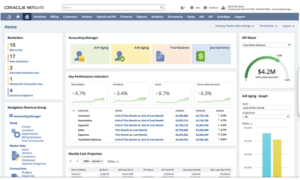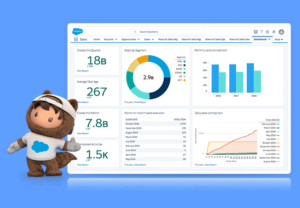NetSuite Salesforce Integration – The Future of Business Connectivity

Sales and Finance teams are super important for a company’s success. But sometimes, they’re kept separate, with Sales using Salesforce and Finance using NetSuite. This can cause problems like bad data and teams not working well together.
The fix? Connect Salesforce and NetSuite. The connection between the two softwares is called the NetSuite Salesforce integration. So, if you are new and wondering what this integration is? What are the benefits? Is it worth it? Allow us to answer these questions in this detailed blog.
Contents
What is NetSuite?
If you are on this blog, chances are you are both aware of NetSuite and Salesforce. But still, if you aren’t familiar with both systems. Let us just quickly let you know about them.

NetSuite is a cloud-based solution. It provides businesses with various solutions that make business operations efficient. To achieve this, NetSuite has developed various verticals to cover every need of the company. These verticals are related to finance, accounting, inventory management, CRM, etc.
In terms of usage, there are various fees involved, like the license fee for NetSuite and some subscription fees. But, overall, many businesses are using NetSuite and reaping its rewards.
What is Salesforce?

SalesForce is a leading provider of cloud-based CRM systems, serving marketing, sales, and support organizations worldwide. Its software allows enterprises to monitor client interactions and analyze behavior, preferences, and engagement effectively, facilitating enhanced communication. SalesForce aids businesses in understanding the customer journey and optimizing the sales cycle for improved performance.
Benefits of NetSuite Salesforce Integration
If your business uses Salesforce and NetSuite separately, it’s worth recommending using them together via a NetSuite integration to benefit more from these tools. The reason for that is that both tools have some great qualities. NetSuite CRM tools are great, and the same is true for Salesforce. However, NetSuite is often best for small to mid-sized business firms, and Salesforce is commonly seen in big companies.
Furthermore, both systems rely on one another for essential information like invoices and pricing quotes. However, if this data is separated in Salesforce or Netsuite, it creates a “data silo.” This means that not everyone in your organization has access to helpful information.
To maximize the benefits of both platforms, it’s best to integrate them. This integration ensures:
- Automatic syncing of data between Salesforce and Netsuite.
- Breaking down existing data silos and preventing new ones.
- Keeping data accurate and up-to-date on both platforms.
- Providing easy access to data, helping sales teams generate leads and make better decisions.
- Eliminating manual data entry, reducing the risk of errors.
Using Salesforce and Netsuite together can significantly improve your business processes. However, you will need to find an appropriate integration solution because they are independent systems.
Why Should You Integrate NetSuite with Salesforce
In today’s fast-paced corporate environment, integrating critical technologies such as NetSuite and Salesforce is not a luxury but a must. Let’s explore why this integration holds immense value for your business operations.
1. Enhancing Collaboration Across Departments
Imagine your sales team can easily check current inventory data within Salesforce. At the same time, the finance department accurately computes and pays out sales commissions, with sales personnel having access to this crucial information.
Operations can swiftly receive sales order details when a deal closes in NetSuite. In addition, customer success teams can quickly check payment statuses and histories directly within Salesforce during customer interactions.
This NetSuite Salesforce integration links different departments, making processes faster and smoother. It eliminates the need for manual data entry, resulting in higher efficiency. This means generating quotations and providing customer service becomes more accessible and streamlined.
2. Boosting Accuracy and Efficiency
Integration empowers your sales team by giving them real-time access to essential data like inventory status, comprehensive product details, pricing insights, and lead times – all conveniently available within Salesforce.
This seamless integration streamlines the Configure, Price, Quote (CPQ) process, guaranteeing precise and prompt quotes and eliminating any delays that might arise from using outdated or incomplete information. By leveraging this integrated system, your sales team can enhance efficiency, accuracy, and customer satisfaction.
3. Elevating Field Sales and Service Effectiveness
Imagine your field sales representatives dedicating their time to your top-tier clients, avoiding unnecessary hassles like chasing overdue invoices. Similarly, in field service operations, you can circumvent sending agents to customers with lapsed maintenance contracts or facing delays due to unavailable parts.
Sales reps can effortlessly review customer payment histories within Salesforce, while field service managers can swiftly assess contract statuses and part availability before scheduling visits. This integration isn’t just about saving time and money; it’s about enhancing your esteemed clientele’s overall sales and service experience.
4. Streamlining the Integration Process
Contrary to widespread assumption, integrating Salesforce and NetSuite does not have to be a difficult or time-consuming process. Many businesses believe learning coding or investing in sophisticated solutions is necessary, but modern integration solutions have simplified this.
For instance, Folio3 Integrator offers innovative capabilities to efficiently complete a fully functional NetSuite-Salesforce integration within weeks. This approach saves time and ensures a seamless and hassle-free integration process for businesses looking to streamline their operations.
NetSuite and Salesforce Integration Tool

Here are three different ways you can connect NetSuite with Salesforce:
Create Your Own Integration: With sufficient funds, time, and technical skills, you can develop your integration between NetSuite and Salesforce. You must establish a communication channel between the two systems using an API to do this. However, administering this can be very complex and challenging if either system undergoes any changes.
Ready-made Connector: Instead of starting from scratch, many firms prefer to purchase a connector from a company specializing in these integrations. This saves you the trouble of building it yourself. However, these connections often focus on integrating NetSuite with Salesforce, which may not meet all your integration requirements.
Data Integration Tool: Another option is to use a tool specifically for moving data between different software systems. These tools are often called ETL or iPaaS platforms. There are numerous options available, each with unique features and pricing plans. They can be helpful because they are built to operate with various systems, including NetSuite and Salesforce.
Conclusion
Ultimately, businesses running both softwares need to consider the integration. NetSuite Salesforce integration is not just the technical update, but we have seen companies benefit from these integrations strategically, too, as their decision-making becomes better with accurate data integrated from both tools at one common place, NetSuite. So, to keep up to date in this competitive environment, you need to consider NetSuite and Salesforce integration.




